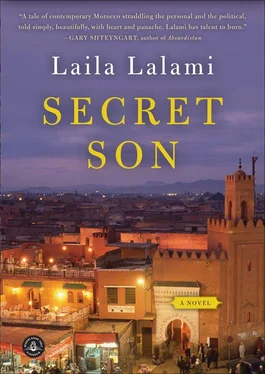YOUSSEF STARTED GOING to the street corner again with Amin. There, he watched people come and go, and sometimes listened to or repeated new gossip. Did you hear that a teenager from Douar Lahouna stole twenty kilos of copper wire from the railway line? The commuter trains from Rabat to Casablanca had to be stopped for several hours while the ONCF made repairs. The boy sold the spools of metal and made enough money to buy a motorcycle. And did you know that Simo was mugged while coming home the other night? The greaser put a razor right here, at the base of Simo’s neck. And did you see the way Sawsan dresses and carries herself? That girl had better watch out; she is looking for trouble.
By early afternoon, Youssef and Amin usually tired of standing at the corner and went to the Party headquarters to see Maati, keeping him company by the entrance. They sat on the white plastic chairs outside and shared his coffee and cigarettes. Sometimes, Maati would tell them one of his new jokes. “Did you hear the one about the police?” he asked. When they both said no, he continued. “The heads of security services from Morocco, France, and the United States meet at a conference, and they make a bet about who is the best at finding criminals. So they come up with a challenge. They release a rabbit into a forest and they each have to try and find it. The Americans go in. They set up a huge command center. They hire informants; they spy on all the animals; they harass the ones that look rabbitlike. After two months, they issue a report saying that rabbits do not exist in that forest. The French go in next. They investigate for two weeks. They can’t find the rabbit. So they burn parts of the forest and make no apologies. It was the fault of the rabbit; he should have turned himself in. Then the Moroccans finally get their turn. They come out two hours later with a battered and bloodied fox. The fox is yelling: ‘Okay! Okay! I am a rabbit! I am a rabbit!’ ”
Everyone burst out laughing. Youssef loved hearing Maati’s jokes, but it frightened him how quickly he fell back into this routine with his old friends, standing around with nothing but words to occupy them. It was as if he had never left the neighborhood, as if his life had never been interrupted.
One day, Amin told Youssef about the lawyer. Maître Chraibi had immigrated to the United States many years ago, had a law practice in New York, and now had an office with a brass name-plate on Chari’ Al Massira. His online ad boasted that he could get green cards to all those who entered the visa lottery through his firm. Most of the applications filed with American immigration services are improperly filled out, the ad warned, so directions must be followed exactly. Why deny yourself an opportunity? Let me take care of the paperwork . All you had to do, Amin told him, was fill out a form and provide a photo, and the lawyer would take care of the rest. The service cost one thousand dirhams, half up front and half after the applicant was called for the consular interview.
“Are you going to apply?” Youssef asked, turning to look at Amin. They had come into the cybercafe after an afternoon of playing chess at the Oasis.
“Not this year,” Amin said, barely taking his eyes off the computer screen. “I don’t have the money.”
Youssef considered this for a moment. “I have enough for both of us.”
“Aw? Where did you get the cash?”
“The money I made from my job. I have enough for both of us. We can both apply.”
Amin pushed the keyboard away and looked incredulously at Youssef. “You would give me the money? Really?”
“Of course.” Youssef said, quickly averting his eyes. He did not want to explain that this was his way of atoning for how he had treated Amin. Maybe this lottery would give them the chance they had been waiting for. It would take both of them out of Hay An Najat this time, and for good. Youssef pictured palm-lined beaches, white picket fences, giant hamburgers, baseball matches, fast cars — it was a dream that came, fully formed, in stereo and in high definition, into his mind. All he had to do was replay scenes from the films and television shows beamed into his home by satellite, and insert himself into the story.
They sent in their lottery applications the next day. Now, all they could do was wait. They spent their days together, shuttling from the street corner to the Oasis, from the Oasis to the cybercafe, and back again. Sometimes, one or the other of them left Hay An Najat to inquire about a job listing, but such occasions seemed more like formalities than possibilities, their names and addresses having already disqualified their applications.
Their routine was disrupted when Amin’s girlfriend Soraya got married — to a store security guard, at a ceremony to which neither Amin’s family nor Youssef’s mother was invited. Amin stopped coming to the street corner in the mornings. He was too depressed to want to leave his house, and when he reappeared, it was mostly at the cybercafe, reeking of hashish. Youssef started going there, too, taking a seat next to him at the computer station. Most of the other customers were looking at porn photos or Islamic Web sites, or both, but Amin was addicted to online chat. He was trying to start a romance with a foreign woman. He was worried that the American consul would deny him a lottery visa because he didn’t speak English very well. He was ready to go anywhere: somewhere in Europe or America was best, but he did not mind the Gulf or Australia, either. He had created different nicknames for different chat rooms in different countries: for the West, he was Ash; in the Middle East, he was Ashhab; and Down Under, he was Heb.
Soon, Amin mastered the bizarre abbreviations made necessary by the bandwidth of his Internet connection. In one window, he typed, “What r u up 2?” while on the other he was waiting for an answer to his message “T où, là?” On yet another window, he used a latinized spelling of Darija to chat with a French Algerian girl: “Finek a zzin?” Amin had no trouble conversing, half-literately, in three languages. He was determined to be a mail-order groom.
“How do you keep them straight,” Youssef asked him, “all these different people you claim to be?”
“You get used to it quickly,” Amin said. “Playing a role, I mean.”
Staring at the screen over Amin’s shoulder, Youssef saw that Katia from Oslo had just asked where he was from. “Casablanca,” Amin typed. A smiley face appeared in the tiny window of the chatting software, but nothing else. Still, that little emoticon was enough to give Amin hope, and he said he would try Katia again in a few days, see if he could get her to talk.
Amin’s belief in his chances was steadfast, and therefore it was infectious. Watching him type with two fingers, Youssef was tempted to consider the idea of an Internet love match for himself — but he could not bring himself to create a fake identity. He was tired of the masquerades. He was Youssef El Mekki; he was his mother’s son, a child of Hay An Najat. He no longer had any wish to be someone else.
He often thought that Maati had outsmarted them all. Three years ago, when he had flunked out of high school, he had seemed to have the least chance of making it. Yet now he was the only one among Youssef’s friends bringing home a salary, the only one who had not wasted his time at the university. Already he had saved up enough to help his parents with his sister’s wedding. Youssef could not help feeling pangs of envy every time he saw Maati at the Oasis.
And the worst of it was: Youssef was luckier than many others he knew. Around the neighborhood, young men from Senegal and Mali and Niger had begun to settle, sharing shacks, eight or ten to a room. They had come looking for Europe but had run out of money on the way and had stayed here in Casablanca. They worked as vendors, porters, or beggars. At any moment, they risked getting picked up by the police or harassed by thugs. But their fate did not raise concern in Youssef, for he was going to America, and surely, surely, such things did not happen there.
Читать дальше












